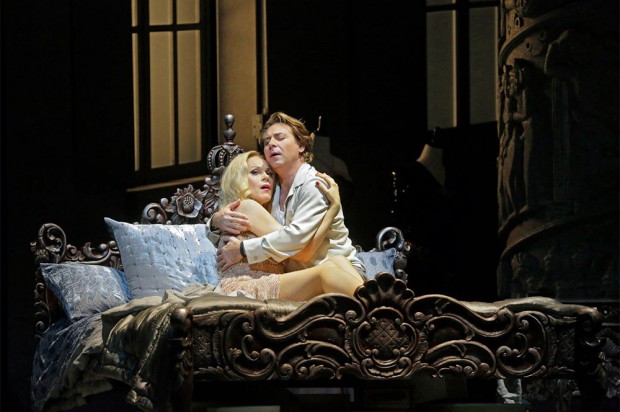Manon Lescaut
Met Opera Live
Puccini’s Manon Lescaut is his first opera worth seeing and hearing, and marks an astonishing progress from what preceded it. But Puccini had yet to learn how to bully his librettists into producing the well-constructed dramas of his later operas, and for all its delights Manon Lescaut is a shambles. Richard Eyre has updated it to France in 1941, to stress the moral ambiguity of everything there and then, with occupying forces, indecisive leading characters, a general unease. That works reasonably well, though the real problem is that Puccini is uncertain about the motives of his central characters, especially Manon herself, who veers between helpless anxiety and ruthless scheming. Her brother isn’t an intelligible creation, but what keeps the work afloat is the ardour of Des Grieux and the too-brief love scenes.
The Met’s staging is absurd, with huge piles of masonry and immense flights of stairs for the singers to negotiate. In this brief opera there were two long intervals where we see the Met’s staff moving around what looks as if it should be the scenery for Aida, and the inevitable lengthy interviews with pre-occupied stars. But one has to say that the Met is a very inartistic institution, advertising next season’s opening night of Tristan und Isolde with a dinner and dance afterwards. A more immediate crime is their immediately preceding their broadcast with the climax of the Lohengrin Prelude to Act I and a few bars of Götterdämmerung, which dwarf, naturally, anything that follows them. Nor did I want to have to watch and listen to a duet from Roberto Devereux in rehearsal, between Acts III and IV of Manon Lescaut.
The performance itself was mainly good to excellent. Roberto Alagna heroically learnt his role in a few days when Jonas Kaufmann cancelled all performances, as usual. Alagna is an adorable artist, utterly identified with the role, singing all-too-ardently but still with powerful effect, and much more idiomatic than Kaufmann is – or rather was – in the same part. And of course Kristine Opolais is the finest Puccini soprano there is, and gave her all, so that the passages between the two were thrilling. The other remarkable contribution was Brindley Sherratt’s as Geronte, a role he admitted to finding uncongenial (who wouldn’t) but was utterly convincing in. Fabio Luisi concentrated on isolated detail, sometimes at the expense of the forward sweep, but Act III, by far the most effective, was shaped brilliantly and made one feel, as I normally do, that it would have been a good idea for the opera to stop there. But Act IV gave its composer his first opportunity to torture its heroine at length, a prospect that he would clearly have found irresistible.






Comments